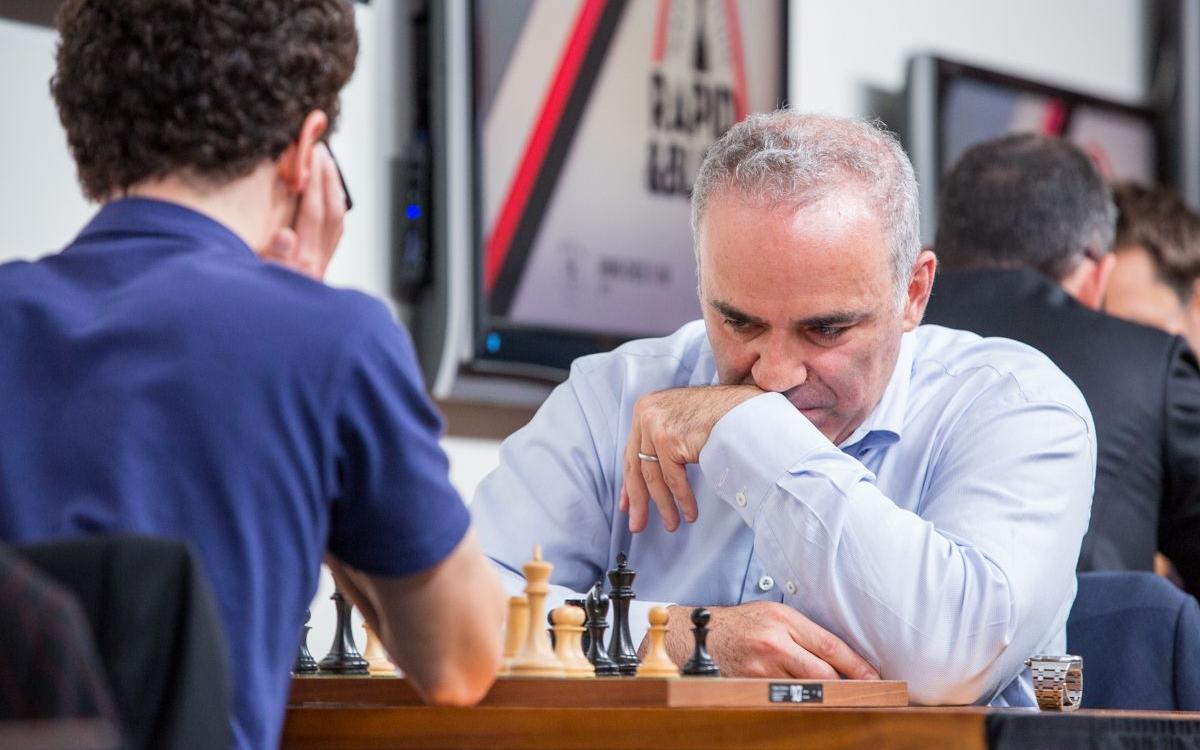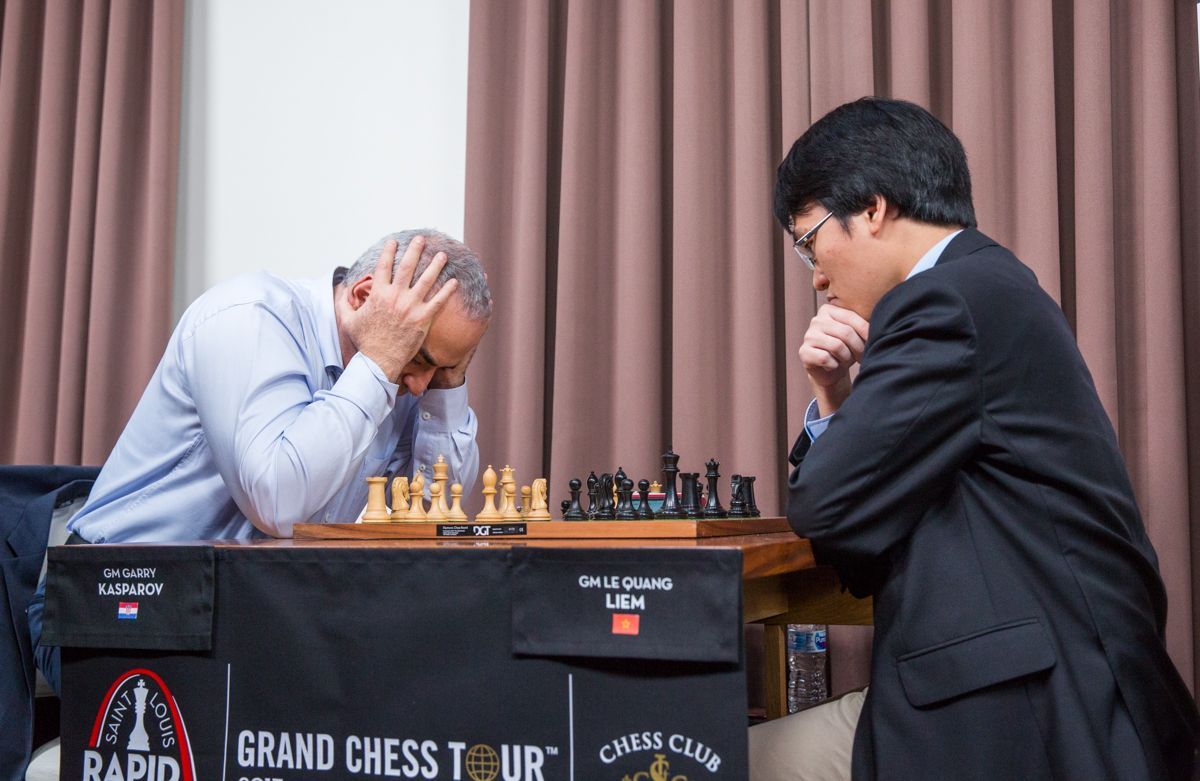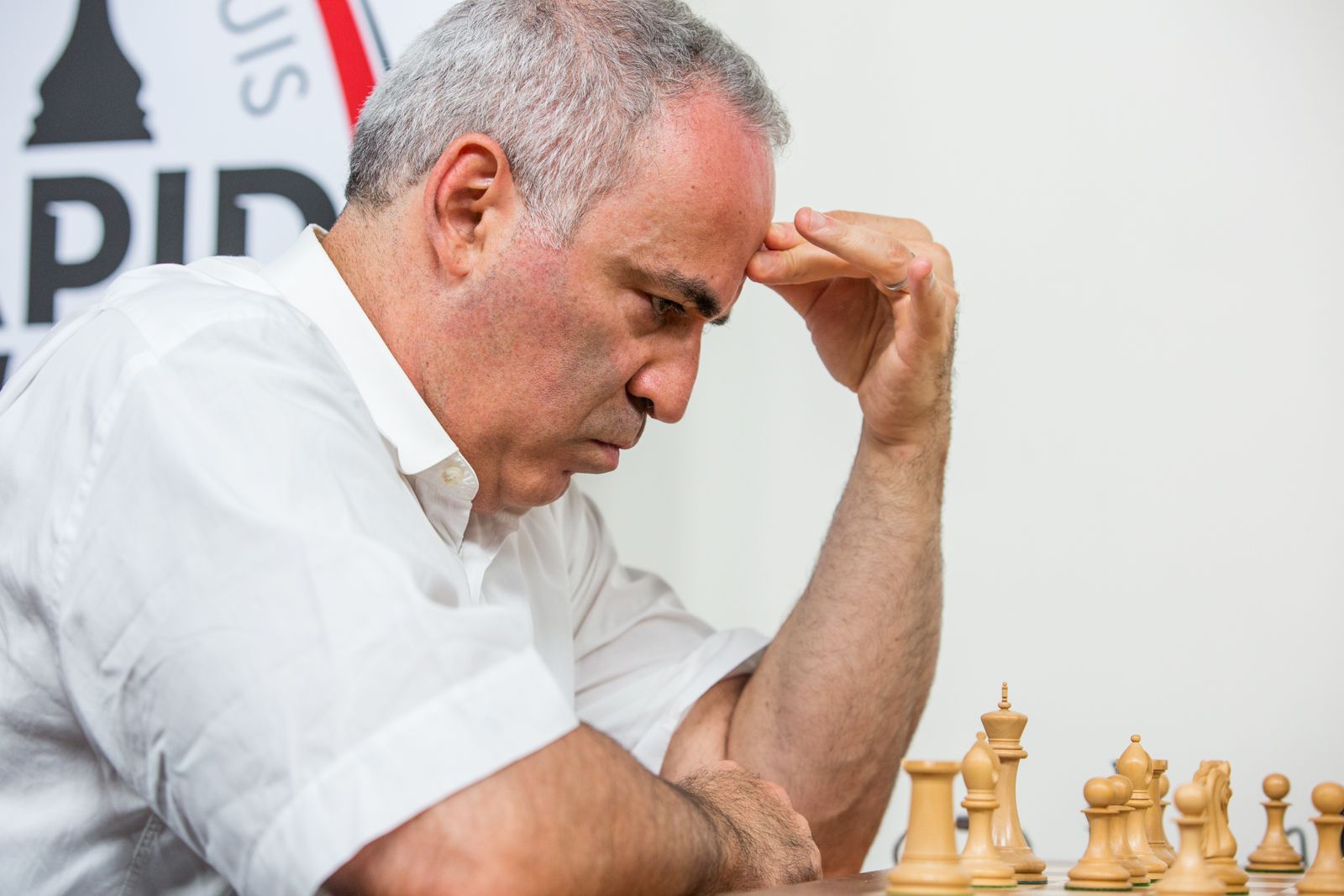
Why Was Kasparov Deep Thinking?
Challenge yourselves and you will challenge the world.
—Garry Kasparov, "Deep Thinking"
In last week's article we stated the obvious fact that the Saint Louis Rapid and Blitz tournament was effectively ruined for Kasparov by his extremely poor time management. Today we'll try to figure out how such an experienced player like Kasparov could get himself in those extreme time troubles in every single game!
The most popular explanation for Kasparov playing extremely slowly was his age. While at his 54 years Kasparov was indeed much older than any other participant of the tournament, I don't buy this theory. During my chess career I played many famous grandmasters who had a tendency to play faster as they aged. They explained that as people get older they also get tired faster.
Therefore thinking for a long time is totally counterproductive for older players as it leads to unavoidable blunders towards the end of the game when they get really tired.

Photo: Chess.com/Maria Emelianova.
My personal explanation for Kasparov's bad time management is totally different and it has something to do with basic human nature. Let me give you an example. Through the years of coaching I noticed that many inexperienced players hate to sacrifice material even if the positional benefits are obvious and all you need to sacrifice is just a pawn.
Let me show you what I am talking about. Here is a very famous game from the world championship match:
For any experienced chess player, the pawn sacrifice 15.g4 is a no-brainer. Indeed the open file and a very strong direct attack against the black king should more than compensate the minimal material disadvantage. Meanwhile when I talk to some lower-rated players about sacrifices like this, generally we have the following discussion:
Me: Do you see how strong the White's attack is going to be after the sac?
Student: Yes.
Me: So, if you have a similar position you'll sacrifice a pawn like this, right?
Student: No way!
Me: Why??
Student: What if my opponent defends and then I will lose an endgame down the pawn!?
You may laugh as much as you want, but I had this kind of conversation too many times, so I am not amused anymore. Indeed the desire to keep things under control (or believe that you can keep things under control) is very natural and you can see it everywhere.
For example, in the September issue of Money magazine was a short article by Helen Rothberg. In this article the author explained that the only reason she changed her job from being a waitress to become a bartender is the sense of control. Confused? Here is her explanation:
I realized that my tips were dependent on so many things that had nothing to do with me: how quickly and well the food was prepared, how many times the busboy watered the table and cleared plates, whether customers could have the baked potato and the rice.
Meanwhile she says that when she became a bartender she "felt something I never had at a job before: a sense of calm and control -- that what I did , and how I did it, could influence my tip."
If you think about it, most of the things people do (getting a higher position at their job, making more money, etc.) are all about getting more control of their lives. So, how can you blame a chess player who refuses to make a promising pawn sacrifice out of fear of losing control over the game?
Such a chess player feels like after a pawn sac the fate of the game is totally in his adversary's hands. If the opponent finds a correct move or a sequence of moves and defends against the attack, then he will win the resulting endgame being up a pawn!
By now you are probably wondering what does this psychological trap that inexperienced chess players fall into have to do with Kasparov's time troubles? Please bear with me, we'll get there!
Let me show you another famous game:
In both games Spassky-Petrosian and Karpov-Korhnoi, White's attack after the pawn sacrifice was very strong, but any chess player would prefer Karpov's attack over Spassky's because all Karpov's moves after the pawn sac were forcing moves and in the Spassky game many moves were non-forcing.
Here is what Jacob Aagaard writes in his wonderful book "Excelling at Chess":
Forcing variations give us a sense of control, while less forcing play, in contrast, can leave us with a sense of floating in the air and lacking control.
You see it is all about looking for control! Meanwhile, it is easy to see that during a game, the vast majority of the time we are using Aagaard's metaphor, just "floating in the air." It is impossible to play forcing moves in every single position and therefore the sense of uncertainty and lack of control is typical for the biggest part of any game. When you play tournament games on a regular basis you learn to live with this sense of uncertainty. At some point you get so used to it that you practically don't even notice it.
Moreover, pretty frequently you can benefit from this uncertainty. Here is what the famous Soviet coach Mark Dvoretsky wrote on the subject:
Experienced players often try to 'hold' the position, not fixing it and not sharply changing its pattern (and forcing events only when this provides obvious benefits).
I deliberately put the last sentence in bold to emphasize that you don't want to force play just for the false feeling of control over the position.
Now let's get back to Kasparov. In the post-event interview he said "I don't know what happened...In every game I had some kind of paralysis...I don't know if it is age or whatever."

Photo: Chess.com/Maria Emelianova.
It is difficult for me to believe that Garry Kimovich is indeed unaware of what really plagued his games since the answer is quite obvious. He didn't play a single official tournament for 12 years and naturally his ability to withstand the uncertainty took a major hit!
Remember, when almost 70 years ago Botvinnik became world champion he didn't play many tournaments. During his preparation for the world championship match vs. GM Bronstein he mostly relied on his analytical work. As a result he almost lost his title.
Later Botvinnik wrote that no amount of analytical work would substitute for a tournament practice. He was absolutely correct since no amount of analytical preparation would make you ready for this sense of uncertainty.
After 12 years of inactivity Kasparov simply couldn't tolerate this "floating in the air" and consequently tried to force things. If he couldn't find a good forcing line he would keep calculating, burning tons of time and unnecessarily losing his energy!
Here are some examples to demonstrate the point.
After 31...Re1 Kasparov had around three minutes and 25 seconds left on his clock. While generally speaking it is not much, considering the completely winning position and the time delay, that should be more than enough to win the game.
Here most masters would play 32.e6 without much thinking, but Kasparov spent more than a minute looking for a forced win! As a result he played two rook checks and he got the following position:
Again, the most natural move, 34. e6, which any experienced player would make almost immediately, wins on the spot. Instead Kasparov spent another 30 seconds and played 34.Nd3 trying to force a win. Indeed the knight attacks the rook on e1 and controls the key c1 square and it looks like the game is over. What he missed is that after 34...Re3! he cannot play 35.Kd4 as he initially planned due to a very strong shot 35...f4!
It was very painful to watch the rest of the game. I am sure that if Kasparov just let his hand play the first moves he saw, he would have won the game. His hand would never play such horrendous moves like 34.Nd3?? But that was the whole problem: he didn't trust his intuition to make the moves and instead tried to calculate everything, looking for 100 percent control over a position.
Will we see Kasparov in action again? I sincerely hope so!
If he learns from his experience in this tournament and plays a bunch of training games against worthy opponents before his next adventure, then I won't be surprised to see him among the top three finishers in the next Sinquefield rapid and blitz tournament.



